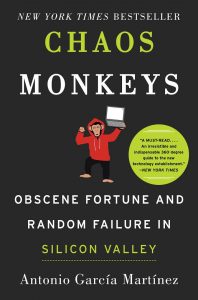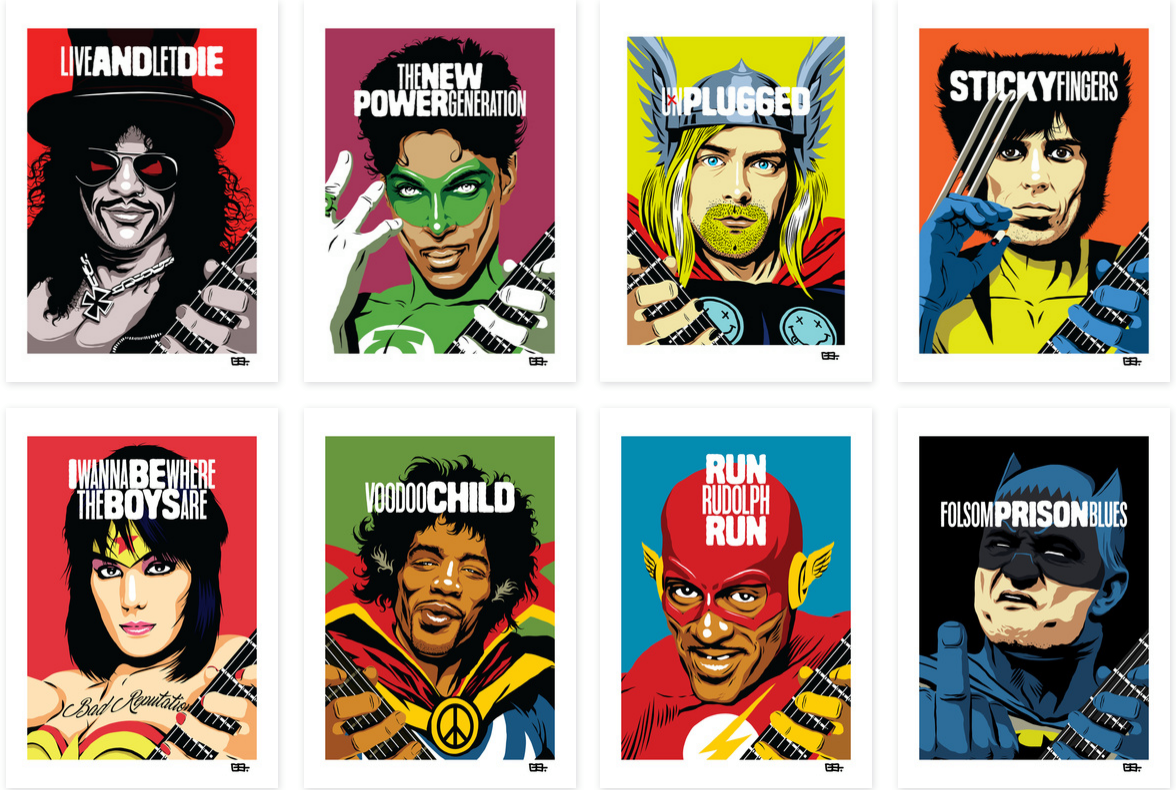Book Review: Chaos Monkeys: Obscene Fortune and Random Failure in Silicon Valley by Antonio Garcìa Martinez (HarperCollins, 2016, 528 pages)
Silicon Valley continues to be hot news in the age of Trump and anti-globalization and it should come as no surprise that a clever book about it by someone in the know, loaded with revelatory insights on how it really works, was going to be a sure-fire hit. And that is exactly what happened when Antonio García Martinez’s half memoir-half prescriptive tech guidebook came out last year on 28 June 2016, becoming an instant “New York Times bestseller”. Considered an “irreverent exposé of life inside the tech bubble”, all the major book reviewers rushed in with praise, from the New York Times’ Jonathan E. Knee (“an irresistible and indispensable 360-degree guide to the new technology establishment”) to Bloomberg’s Ellen Huet (“dives into the unburnished, day-to-day realities: the frantic pivots, the enthusiastic ass-kissing, the excruciating internal politics”).
In short, in just six months, “Chaos Monkeys” has become the most popular and widely read book about Silicon Valley. I was curious to find out whether it merited its sudden glory. I uploaded it to my Kindle (disclosure: living far from bookstores, I am a fan of e-books) and I spent a couple of pleasant days enjoying the read. And I soon discovered that the best passages, literally pearls in the text, had been highlighted hundreds of time by enthusiastic fans. In fact, Amazon in its “about the book” section informs you that (at the time of my reading) 3,769 passages had been highlighted 122,000 times (ah, the joys of Big Data).
It is a clever book with a clever title, and a great read. In case you’re wondering about the title, it comes from the name given to the software procedure used to test the stability and resilience of online services/websites – and this neatly expresses the main message of the book: That tech entrepreneurs are society’s chaos monkeys, out to disrupt the way we live, from photo-sharing (Instagram), dating (Tinder) and movie viewing (Netflix) to transport (Uber), lodging (AirBnB) and space travel (SpaceX).
Unquestionably, the author’s persona was as much part of the excitement as his bracing writing style. Described as an “industry provocateur” on his Amazon book description page, he has lived up to his reputation and become something of an industry guru: today, whenever big news or scandals roil Silicon Valley, journalists rush to ask him his opinion.
Photo Credit: Helena Price
Garcìa Martinez started his working life as a strategist for Goldman Sachs, survived three years and surprised everyone by abandoning New York for the West Coast. After learning the ropes at an IT advertising outfit called Adchemy, he launched his own start-up AdGrok with a couple of engineering pals (called “the boys” in his book). Ten months later, after raising some venture capital and before even making AdGrok operational, he sold it to Twitter for $5 million. However, it was not an unmitigated success; his team broke up, “the boys” went to work for Twitter to develop AdGrok while he accepted a more lucrative position at Facebook as product manager. Tasked with leveraging Facebook’s user data to make its advertising more effective and fix its monetization problem, he was outcompeted by a colleague and fired – the circumstances of his firing make for fascinating reading.
Related article: “THE SECRET TO DRIVING CUSTOMER ENGAGEMENT”
The description of what Facebook is like, what happened there and why he eventually left and landed an advisory position at Twitter is certainly one of the more interesting parts of the book – anyone thinking of joining Facebook should read it very carefully, drawing lessons from it. But on a broader level, as a reader uninterested in working there, his tale is a delight to read: It includes juicy descriptions of (parts) of his personal life, his tryst with a woman he barely knew and called “British Trader” (she became the mother of his two children), his beer-drinking/brewing exploits at Facebook (including flooding Zuckerberg’s desk), his life on a (damp) sailboat, his exhilarating racing of sports cars on Route 101. Then, when it was all over and he found himself jobless, he went on to write his book. Today, he is still officially on leave from his Berkeley PhD program and lives on a forty-foot sailboat on the San Francisco Bay.
Photo Credit: Pexels
Some have suggested he wrote his book to take revenge on Facebook. I don’t think so. The fact is that he simply describes very effectively the in-fighting among middle-level managers (of which he was one). He shows how Sheryl Sandberg (his boss and the famous author of Lean In) didn’t really know in detail what was going on among her middle-level managers. Not all the ideas swirling at this level reached her (his didn’t). But there is nothing unusual about this. This distance between top management and the middle level is not particular to Facebook. It is a common situation (and a problem) among most big corporations, and Facebook is no longer a start-up, it is a big company in its own right.
The way he explains Facebook makes for some of the best passages in the book, like this metaphor: “Imagine yourself in a noisy, busy bar in the lively downtown in any large city in America […] Facebook is the rowdy assemblage of humanity talking, gossiping, flirting, sharing, and creating experiences.” (p.298) Then he asks the big question that dogs Facebook (and, for that matter, any online media): how do you turn the knowledge gained from a “transcript of every conversation taking place as well as an anonymous ID for every individual” on the platform into a “breakout product à la Google AdWords, that would completely change Facebook’s fortunes”? Any marketer worth his salt will love his musings on digital advertising that span several chapters, in particular his “rolling debate” with Facebook legal teams over privacy matters: “privacy is to Facebook as nuclear weapons are to Iran: this constant cloud overhead” (p.325)…
What is perhaps more striking than the author’s antics (however hilarious) are his messages to society, and indeed, those are the ones that got highlighted the most. Unsurprisingly, the ones that got most attention were the “lessons” to entrepreneurs.
For example, he candidly lists for us, on the basis of his “limited experience”, what are the “traits that distinguish successful startup founders at whatever level of the game, from the forgettably minuscule (e.g. AdGrok) to the epoch changing (e.g. SpaceX)”. And these are:
- “First, the ability to monomaniacally and obsessively focus on one thing and one thing only, at the expense of everything else in life” (p. 164). And he goes on to tell us that he “lived, breathed and shat AdGrok”, that he watched his daughter grow up “through the frame of a Skype window”, that he had no social life “outside of schmooze-and-booze tech events”, even his beloved sailboat was left to rot in the sun;
- “Second, the ability to take and endure endless amounts of shit” (p.165) and he rushes to explain that he was raised “under the sadistic care of a sister ten years [his] senior”, his father was a “domineering man, in every way”, he went to an all-boys Catholic school “filled with brutish bullies and cold, aloof priests”, he was a “penniless grad student” and survived “three years on Wall Street’s most competitive trading floor during its biggest market catastrophe” (this in reference to the 2008 Big Recession).
He ends that chapter with an afterthought: “Incidentally, it helps to have enemies.” Acknowledging “love is beautiful”, he wryly notes “far more empires have been built, books written, wrongs righted, fights won” as a result of a “vengeful desire to prove some critic wrong” or out of a deep fear of some enemy. And he concludes: “Love is grand, but hate and fear last longer.”
Yes, that is the kind of book and kind of man he is: astutely observant, a strong sense of humor, colorful language, brilliant exposé of what’s what in the fast-riding, fast-living world of Silicon Valley. A morality tale? Not quite, but definitely a recommended read for anyone interested in our technological future.
Recommend reading: “ZUCKERBERG IMPLIES FACEBOOK IS A MEDIA COMPANY, JUST ‘NOT A TRADITIONAL MEDIA COMPANY'”











